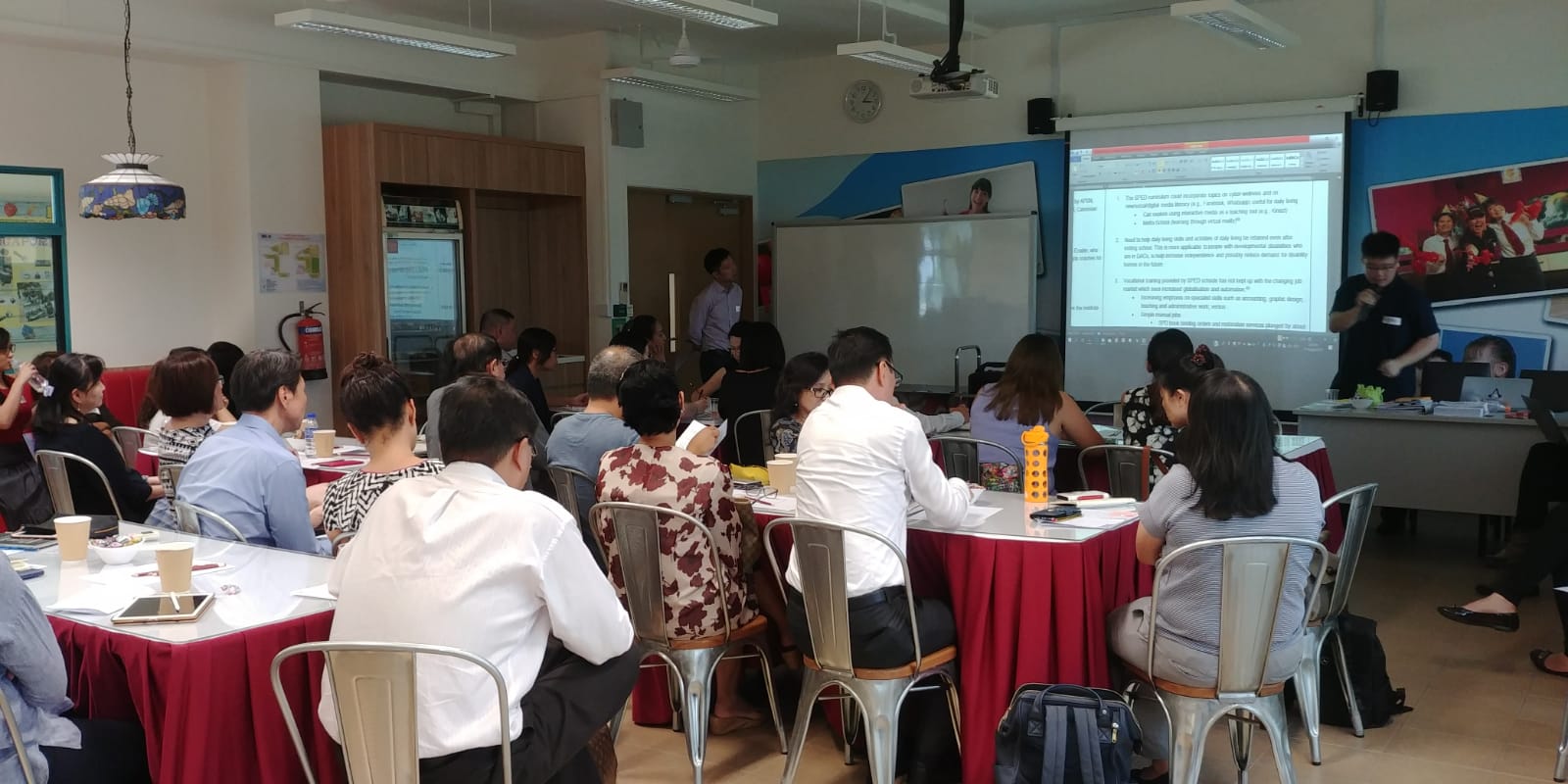Difference between revisions of "About the Social Collab SG initiative"
| Line 1: | Line 1: | ||
| − | [https://drive.google.com/file/d/ | + | See [https://drive.google.com/file/d/1Ed56ZWE_gnmfVS13w1ClbIqGtQ9T_lkH/view?usp=sharing Powerpoint Slides] from Presentation at [https://festivalofideas.nus.edu.sg/program/day-3/citizen-mapping-of-social-needs-through-open-collaboration-community-networks/ LKYSPP's Festival of Ideas 2019] |
==== '''Purpose''' ==== | ==== '''Purpose''' ==== | ||
Latest revision as of 02:00, 25 November 2019
See Powerpoint Slides from Presentation at LKYSPP's Festival of Ideas 2019
Contents
Purpose
To seek the partnership of community stakeholders to understand social needs in Singapore through an online wiki platform and offline networks centred on target populations.
Background
Understanding client needs and service gaps is crucial in planning public services and informing policies. Typically public agencies, non-profits, researchers and practitioners do this type of work, but in isolation and not necessarily coordinated with one another.
Agencies that specialise in a task or domain area tend to want to live up to expectations and be seen as competent and authoritative. They may not be receptive to challenges from external observers, and end up selectively revealing information in order to manage their reputation. It would be unhealthy if their focus ends up being to manage stakeholder perceptions.
A more openly collaborative approach can be beneficial. This involves Singaporeans playing a greater role in identifying social needs and gaps instead of leaving it to a centralised party. It can promote a culture of honesty, information-sharing and transparency about needs and gaps in our society.
This has become feasible given the easy access to online platforms and easy-to-understand needs assessment frameworks.
See "The promise of open collaboration in delivering social services".
Benefits of Open Collaboration
- Quality of knowledge: Reports are static once they are completed, and new policies and services emerge all the time. With good management and ongoing contributions from partner organisations, the wiki platform can serve as a constantly updated and relevant knowledge base.
- Growth of knowledge: Facilitating open collaboration through the wiki will help individual efforts contribute to a more exponential growth in knowledge, when more can contribute in a coherently accumulative fashion. Having access to this collective knowledge base also reduces the burden on individual agencies and VWOs to do needs assessments and asset mapping.
- Community ownership: Public agencies, VWOs and researchers sometimes compete with one another to for thought leadership and authority in a specific domain of knowledge. However, no single agency no matter how well-equipped has monopoly over useful knowledge. Open collaboration democratises this work and allows all to contribute, and facilitates greater sharing so that needs assessments do not become proprietary knowledge of agencies or researchers, but free content that is more widely shared with communities and practitioners.
- Culture: When an organisation produces a report, its credibility and reputation is at stake. This may lead to defensiveness about the knowledge produced, and deliberate glossing over of limitations and gaps. This can detract people who are well-meaning from the task at hand. Since no single organisation can claim credit for the knowledge produced via open collaboration, a more conducive ethos of working is possible where participants are transparent about their ignorance and willing to have others fill in those gaps for them.
The Wiki Platform
The objective is to produce a constantly-updated knowledge base by coherently accumulating relevant statistics and trends, tracking community developments, looking at service and policy gaps, and crowd-sourcing good ideas. Once a year, practitioners, community partners and researchers can collectively make sense of existing information to generate a yearly Needs & Gaps Report for informing policy, support advocacy and highlighting knowledge gaps to guide further research.
Anyone can contribute to these wiki pages, but each specific social cause (Disability, Migant Workers, Seniors) is anchored by a team from diverse partner organisations who will provide editorial work, solicit expert inputs and also convene sense-making meetings to refine and improve the knowledge base. If you would like to join a social cause team, please click on that page to find the respective contact details.
How to Contribute
Individuals from partner agencies can email Andrew Lim (andrew.lim@nus.edu.sg) for a user id and a password, and be able to edit wiki pages.

The wiki is designed specifically to help participants contribute the following information in a coherent manner:
- The profile and various needs of a particular client group;
- Existing communal resources available to address those needs;
- Assessments of service or policy gaps;
- Potential reasons or known causes of the gaps; and
- Ideas and possible solutions
While the system does allow us to track what user provided what information, we should not focus on who has contributed what, and only the quality of information provided (i.e., accurate, from a credible and verifiable source).
When an organisation chooses to share relevant administrative data from their services (e.g., profile of clients, waitlists, performance data), they should indicate the organisation and insert a contact person so that this can be verified. This information should not disclose personal data that identifies individuals.
Offline Roundtables
While the wiki helps to facilitate the coherent accumulation of knowledge, it will be complemented by offline Roundtables/meetings that comprise contributing organisations in the same sector. A recent example is a Roundtable to discuss Employment for Persons with Disabilities on 11 May 2018, organised by the Disability Community Network.
A Needs & Gaps report can also be consolidated annually from wiki inputs, to paint an overview of the landscape of their sector. This landscape view will be comprehensive because it can include the contribution and meaningful participation of all relevant partners in this space beyond government agencies and experts alone, who are not able to have a full and updated view of the diversity of developments in each sector. This will not only facilitate the strategic planning for each organisation, but also act as policy advocacy if it is shared with the relevant Ministry (e.g., A Needs & Gaps Report on Distressed Migrant Workers can be shared with MOM, MSF and TAFEP). It will also allow NGOs in that space to coordinate with one another what areas to investigate and research on.
What Resources and Commitment is Required?
Very little. For now, IPS is happy to meet individual VWOs and NGOs to help consolidate the information they have on hand. This might mean visiting the organisation and having a chat with one or two staff about information they have that is relevant and will be able to share. We will then populate relevant information onto the wiki. (Talk to us)
Subsequently, we will host a first meeting to gather all those who have contributed, and invite others whose interest has not been solicited. We will facilitate this discussion and identify knowledge gaps. Participants can indicate what the areas of priority are for them. (Show up)
Participating organisations are then free to fill in those knowledge gaps if they are able to engage researchers, interns or do it themselves. There is no obligation to investigate further if there is no capacity. IPS will also dig deeper to find relevant information and help. (Dig deeper if you can)
After this period, IPS can convene other meetings to take stock of new information, and help to write a Needs & Gaps Report based on the inputs of participating organisations. A draft will then be sent out to everyone for their inputs and refined based on their comments. (Show up again)
If required, we can broker connections to policymakers to ensure that certain areas of concern are highlighted. These can come in the form of closed door discussions or more public policy forums depending on the issue.
Existing Partners
The first call to action was done in July 2016 and there are existing organisations working on various social causes: Disability (Disabled People’s Association, NVPC, NYC) Ex-Offenders (SANA), Migrant Workers (HealthServe), Seniors (Tsao Foundation).
Other organisations are providing backbone support in terms of the IT infrastructure, knowledge architecture and community engagement (Lien Centre for Social Innovation, A*Star, Institute of Policy Studies, Asian Centre for Social Entrepreneurship, National Volunteer and Philanthropy Centre).
Students from some tertiary institutions are willing to help populate pages on certain causes as part of their coursework. We can host ‘wikithons’ where students get together to search for relevant material to be added to wiki pages.
We can also start to engage journalists who report on social issues to participate by adding information and links to articles they write. This benefits the community and draws attention to their reporting.
More backbone support, such as devising editorial policies and guidelines, training users and designing the 'look and feel' of the wiki pages, is necessary. We also need people who can communicate the purpose and value of this work, so that more can come on board. For more details on who we are and our plans, see our Action plan. If you would like to join us to provide backbone support to this initiative, look at our action plan to select the team(s) you are interested in, and get in touch with the contact person.
We are also looking for volunteers to complete very specific tasks and projects, including UI/UX, marketing, etc.
